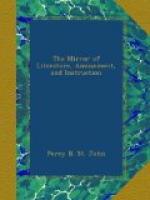To say that Popanilla resembles Swift’s “Tale of a Tub,” or Sir Thomas More’s “Utopia,” would be an advantageous comparison for our modern voyager, but it would not sufficiently illustrate the character of his work, since the latter books are so much less read than talked of. Swift wrote “for the universal improvement of mankind,” but Popanilla publishes for the benefit of the people of England, whom he represents as living in a too artificial state. He tells his story as the native of an Indian isle, whose men combine “the vivacity of a faun with the strength of a Hercules, and the beauty of an Adonis,” and whose women “magically sprung from the brilliant foam of that ocean, which is gradually subsiding before them.” This favoured spot he calls the Isle of Fantaisie, about the shores of which appears a remarkable fish, or rather a ship, to the no small terror of the islanders. The ship is wrecked, and Popanilla “having in his fright, during the storm, lost a lock of hair which, in a moment of glorious favour, he had ravished from his fair mistress’ brow,” is next introduced in search of this precious bijou. “The favourite of all the women, the envy of all the men, &c. &c, and—you know the rest,—Popanilla passed an extremely pleasant life. No one was a better judge of wine—no one had a better taste for fruit—no one danced with more elegant vivacity—and no one whispered compliments in a more meaning tone. What a pity that such an amiable fellow should have got into such a scrape!”
Instead of the dear lock, Popanilla finds a chest saved from the wreck, and filled with “Useful Knowledge Tracts,” books on “the Hamiltonian system,” &c. which our adventurer, like Faustus and his bible, turns to bad account; he falls asleep, is swallowed by a whale, and spouted forth again. “The dreamer awoke amidst real chattering, and scuffling, and clamour. A troop of green monkeys had been aroused by his unusual occupation, and had taken the opportunity of his slumber to become acquainted with some of the first principles of science. What progress they had made it is difficult to ascertain. It is said, however, that some monkeys have been since seen skipping about the island, with their tails cut off; and that they have even succeeded in passing themselves for human beings among those people who do not read novels, and are consequently unacquainted with mankind. As for Popanilla, he took up a treatise on hydrostatics, and read it straight through on the spot. For the rest of the day he was hydrostatically mad; nor could the commonest incident connected with the action or conveyance of water take place, without his speculating on its cause and consequence.” So much for the first steps of “intellect;” now for the “march.” Popanilla soon becomes a man of science: his wit flies off in tangents, and he tries to prove his sovereign a lantern, and himself a sun,[10] by undertaking to re-shape all the institutions of Fantaisie. Then follow a string




